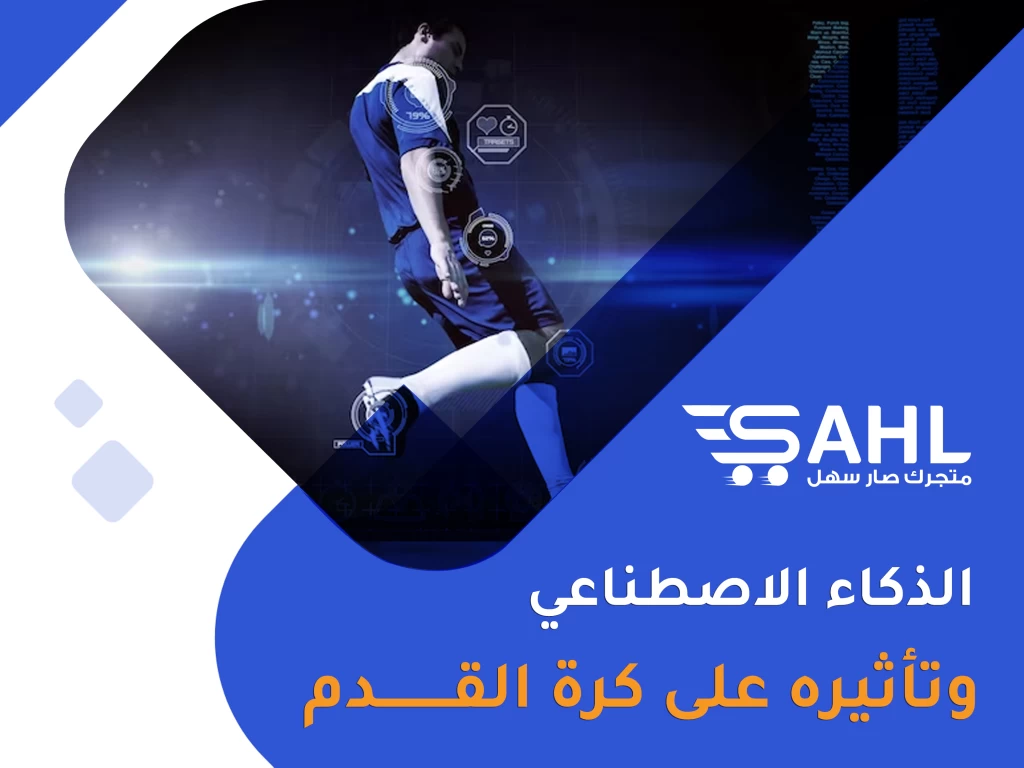Free support 24/7
Free support 24/7

The technological advances of the modern era have radically transformed various aspects of our lives, including sports. Among the technological innovations that have greatly affected the world of football, artificial intelligence comes first. Artificial intelligence has introduced significant changes and a creative revolution in how this popular sport is practiced and developed, whether at the level of individual player performance or improving team strategies and fan experience.
Applications of artificial intelligence in the world of football may include:
Player performance analysis: Artificial intelligence can be used to analyze players' performance during matches. By monitoring available data such as running speed, number of touches, and successful passes, coaches and players can understand strengths and weaknesses and work towards improving individual performance.
Injury optimization and rehabilitation: AI can be used to analyze player data and detect possible signs of fatigue and injury. This can help reduce the risk of injuries and develop effective rehabilitation programs.
Analyzing teams' strategies and playing styles: AI can analyze past matches and track different teams' strategies. This can give coaches deep insights into how to improve playing patterns and detail competition strategies.
Improving fan experience: Through AI technologies, a better fan experience can be provided by providing advanced in-match analytics and real-time statistics, which increases the fun of watching the game.
The use of monitoring and arbitration techniques: Artificial intelligence can be used for monitoring and arbitration techniques, which helps in avoiding arbitration errors and increasing fairness in matches.
Development of game bots: Game bots are developed using smart technologies, and this can have an impact on training players and improving performance.
Match data analysis and competition strategies: AI can be used to analyze match data and opposing teams' strategies. By processing the big data generated by matches, coaches can analyze patterns of play and discover hidden patterns and estimations to achieve a tactical advantage.
Development of sportswear technology and equipment: Artificial intelligence can be used to develop sportswear technology and equipment used in football. For example, shoes can be designed to respond to players' movements and provide the ultimate in support and comfort.
Team Performance Analysis: In addition to analyzing individual performance, AI can be used to analyze team performance. This can help develop attack and defense strategies and interactions between players.
Prediction of match results and events: Artificial intelligence can be used to analyze historical data and variable factors such as weather conditions and player injuries, to more accurately predict the results of matches and various events.
Referee training and fairer refereeing: AI technologies can be used to train referees and provide impartial analysis of refereeing decisions, increasing fairness and reducing controversy.
Virtual Fan Experience: Virtual reality and augmented reality can be used to improve the experience for fans, as they can follow matches from different angles and interact with the game more.
Improving the training of young players: By using artificial intelligence techniques, the training processes of young players can be improved by constantly analyzing their performance and directing them towards developing their skills effectively.
Development of advertising systems and live broadcasts: Artificial intelligence can be used to improve advertising systems and live broadcasts of matches. By analyzing viewers' interests and engagement with content, targeted ads and an enhanced live streaming experience can be delivered.
Developing video games and interactive experiences: Artificial intelligence can be used to develop football-inspired video games that allow fans to experience the game from a new angle and challenge their tactical skills.
Audio and video data analysis: Intelligent technologies can be used to analyze audio and video data from coaches and players during matches and training, helping to better understand communication and information exchange.
Personalized gaming experience: AI can provide fans with a personalized gaming experience, where people can experience players' roles and make decisions in the course of matches.
Data-driven training strategies: AI can analyze training data for players and suggest customized training strategies aimed at improving strengths and covering weaknesses.
Engaging with Fans on Social Media: AI can be used to analyze fans' social media posts and derive their interactions and feelings towards teams and players.
Directing strategic analysis of small teams and national teams: In addition to large teams, artificial intelligence can direct the analysis and strategies of small teams and national teams, contributing to the strengthening and development of their competition.
International Collaboration and Cultural Exchange: Advanced technologies and data sharing enabled by AI enhance communication and cultural exchange between teams and players from around the world. This can lead to introducing new approaches and innovative ideas for game development.
Improving the experience of fans in stadiums: Through artificial intelligence technologies, it is possible to improve the experience of fans in stadiums through systems for organizing seats and time, and providing better services and different entertainment experiences.
Develop sports commentary and analysis systems: Artificial intelligence can be used to improve sports commentary and analysis systems during matches, providing viewers with deeper details about events and game details.
Discovering emerging talents: AI can analyze the data of young players and discover emerging talents from different places,
Which contributes to building a strong future for teams and teams.
Interacting with fans through virtual and augmented reality technologies: Artificial intelligence can be used to develop interactive experiences for fans through virtual and augmented reality technologies, allowing fans to participate in events and matches in a more interactive way.
Analyzing player health data: AI can be used to analyze player health data, such as heart rate and fitness levels, to provide accurate guidance for improving physical and health performance.
Research and development of new technologies: AI can spur research and development of new technologies such as deep learning and machine learning, enhancing the potential for utilization of these technologies on and off football.
Improved physical and tactical training experience: AI contributes to improving the quality of physical and tactical training for teams and players. It can be used to identify strengths and weaknesses in each player's physical performance and create customized training programs aimed at making the most of their strengths and improving their weaknesses.
Guide coaches' decisions during matches: Artificial intelligence is used to provide coaches with accurate and real-time analysis during matches. This helps them make better strategic decisions based on real-time updated information and statistics.
Developing Virtual Training Games: Intelligent technologies can be used to develop virtual training games that help players develop their skills and make quick decisions in the context of matches.
Analyze the impact of weather and stadium conditions on performance: AI can analyze the impact of weather conditions and stadium characteristics on the performance of teams and players, enabling coaches to adapt their strategies and tactics appropriately.
Improving the security of stadiums and sporting events: Artificial intelligence can be used to develop advanced security systems to protect stadiums and sporting events from security threats.
Providing advanced analytics for sports media: Sports media benefits from advanced analytics provided by smart technologies to provide in-depth reports and analysis on matches and players.
Develop data collection systems: AI can improve data collection systems by leveraging sensing and tracking technologies, providing accurate data for analytics.
Using bots in training and testing: AI-equipped bots can be used to simulate the behavior of players and test their interaction with different scenarios, which helps in evaluating their performance and making tactical decisions.
Achieving justice and transparency in arbitration: Artificial intelligence contributes to improving the quality of arbitration by objectively analyzing arbitration decisions, which contributes to increasing transparency and achieving justice in matches.
Performance and potential injury predictions: AI can provide accurate predictions about the performance of teams and players in upcoming matches, as well as predict potential injuries based on analysis of health data.
Developing Self-Coaching Techniques for Individuals: AI can be used to develop self-coaching techniques for individuals, whereby fans and hobby players can receive personalized coaching guidance to improve their personal level.
Improve team play strategies: AI can be used to improve team play strategies, both offensively and defensively, by analyzing interactions between players and developing more coordinated tactical plans.
Interact with players and collect their feedback: AI can analyze players’ interactions with training and matches and collect their feedback automatically, helping to understand their needs and improve their experience.
Continuous Improvement and Adaptation: AI can learn from changing data and continuously improve its performance and accuracy, allowing it to adapt to game developments and surrounding variables.
Researching new technologies to improve safety and physical health: AI can be used to develop new technologies to improve player safety and reduce injury incidents, as well as health and fitness applications.
Analysis of international competition strategies: AI can analyze international competition strategies between teams and national teams, which helps analyze playing patterns and benefit from them in development.
Collaboration with players in developing technologies: Collaboration between players, engineers, and developers can be encouraged to develop new AI-based technologies, ensuring that these technologies are compatible with players' needs and expectations.
In the conclusion of this article, we find that the impact of artificial intelligence on the world of football is not only limited to playing performance, but extends to all aspects of this popular sport. Through data analysis and the use of machine learning techniques, individual and team performance is improved and playing strategies are developed, along with an improved fan experience, training development and more accurate and fair refereeing.
These smart technologies enhance the depth of analysis and provide valuable insights for coaches and fans alike. Contribute to improving stadium safety and enhancing communication between teams and fans. The benefits of artificial intelligence also extend to a wide range of aspects, such as developing sports games, fair refereeing, discovering emerging talent, directing tactical decisions, and improving physical and tactical training.
Therefore, it can be said with confidence that artificial intelligence has added a new and exciting dimension to the world of football. These technologies enhance the quality of the game and provide a better experience for players and fans alike. As developments and innovations continue, we can expect more improvements and positive changes in the future of football, which will ensure that this sport continues to maintain its attractiveness and development both locally and globally.

صفحة المنتج هي أهم نقطة قرار داخل المتجر الإلكتروني يا إنها تقنع العميل يكمل الشراء يا إنها تضيّعه في تفاصيل مالها داعي

دخول السوق الأوروبي صار أسهل من قبل بفضل تطور أدوات الترجمة والتقنيات اللوجستية الذكية
You can create your store easily